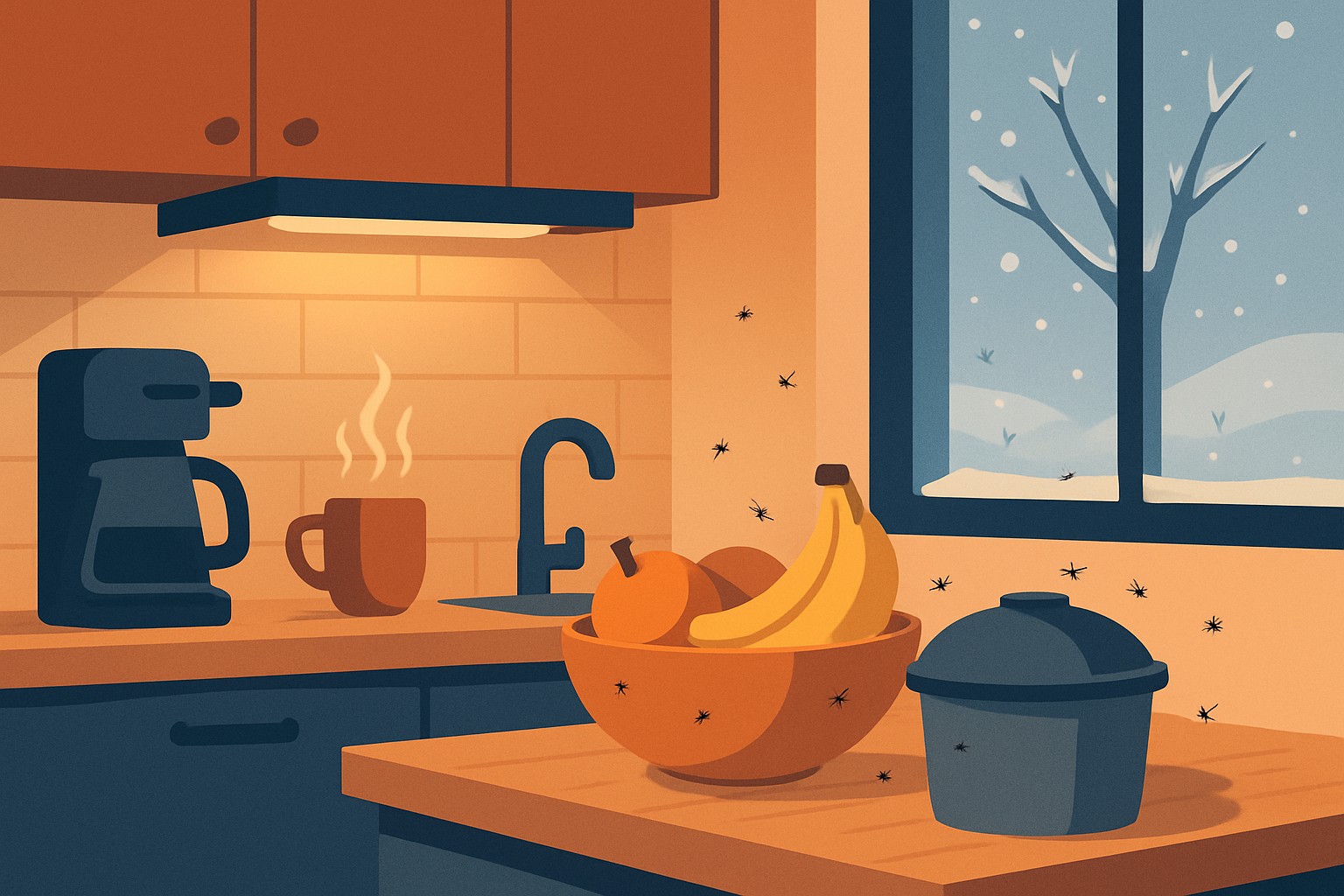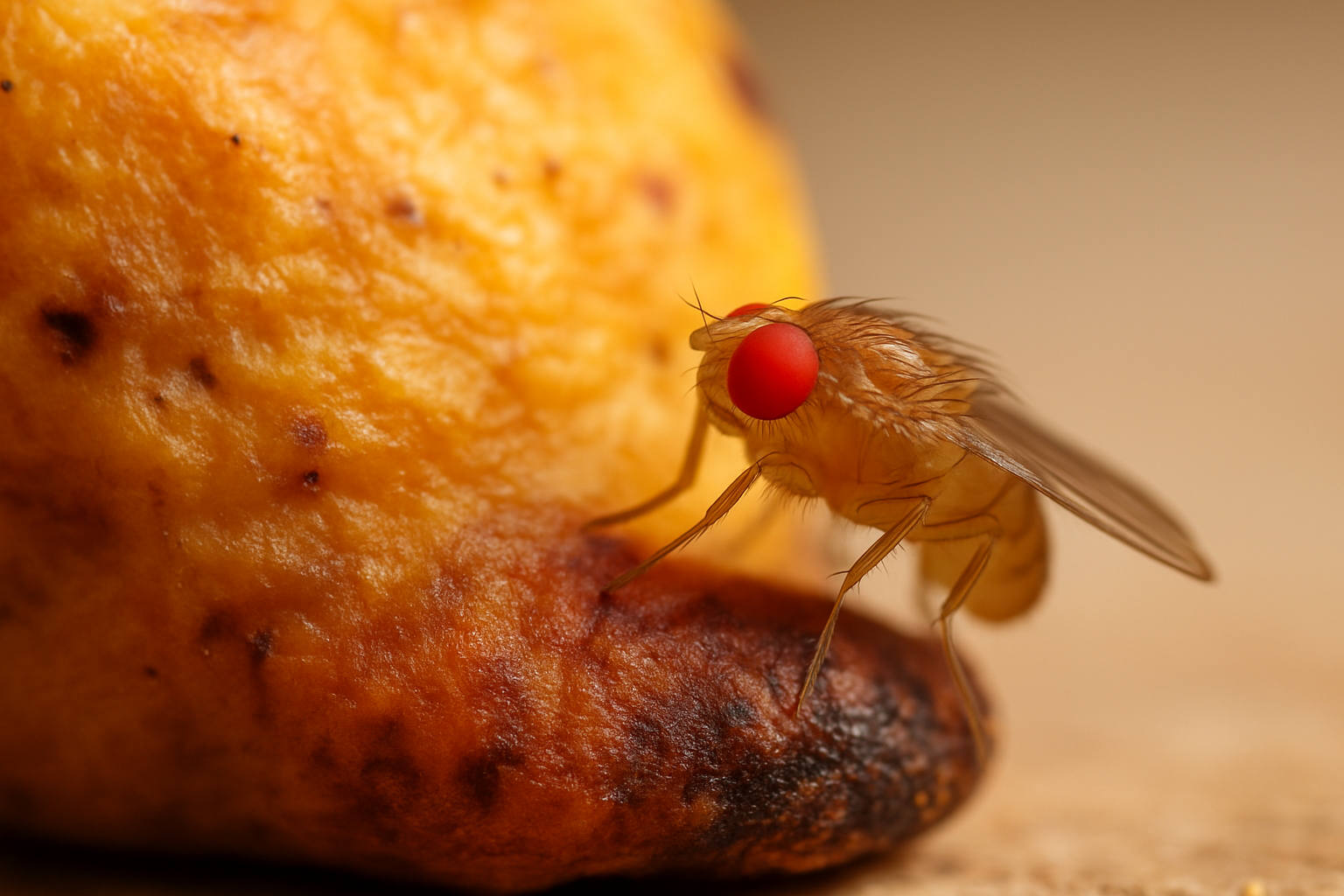
Why You Still See Fruit Flies in the Winter Months?


Fruit flies in the winter? While these tiny troublemakers typically make their grand entrance during warmer months, believe it or not plenty of people still catch sight of them in the dead of winter.
What Exactly Are Fruit Flies A Simple Introduction That Just Might Surprise You
Fruit flies or Drosophila melanogaster are tiny critters roughly the size of a sesame seed—about 1/8 inch (3-4 mm) long. They have a weakness for ripe or fermenting fruits and vegetables where they set up shop to lay eggs and grab a snack. These guys multiply faster than you can say "kitchen infestation." It’s no surprise they often show up uninvited near your trash or countertop. While they don’t bite and aren’t dangerous, they can be pretty annoying.
Why Do Fruit Flies Seem to Make a Grand Appearance Every Summer?
Fruit flies really hit their stride when the mercury climbs between 75°F and 85°F. This explains why they crash the party mostly in summer. Warm weather kicks their breeding into high gear with females laying hundreds of eggs in damp fermenting organic matter like little egg factories. These tiny eggs hatch lightning-fast into larvae that grow into adult flies in about a week. When summer heat combines with rotting fruit it creates a perfect storm for their population to boom.
Common Misconceptions About Fruit Flies in Winter—What You Might Not Realize
- Fruit flies can buzz around and stay surprisingly active outdoors even when the temperature feels like freezing.
- Like a few other stubborn insects, fruit flies tend to hibernate outside and tough out the winter months in their own way.
- Cold temperatures don’t wipe out all fruit flies and their larvae immediately. Some manage to hold on, showing they’re tougher than you might expect.
- These little critters mostly appear because of rotting fruit and in my experience, they rarely bother other indoor snacks.
Research and observations reveal these are pretty common misconceptions. Adult fruit flies simply can’t tough it out in freezing outdoor temperatures, so they cleverly dodge winter by taking up residence indoors or in cozy heated spots where conditions stay nice and steady. They don’t actually hibernate but rather tweak their reproductive cycles to keep things going. Plus, they aren’t picky eaters limited to just fruit—they happily survive and breed on all sorts of fermented organic materials.
How Fruit Flies Somehow Manage to Survive the Winter
Fruit flies usually make it through the winter by sneaking indoors where it’s nice and toasty and food is available year-round. They dial down their life cycles and take it easy on reproducing during the colder months. More often than not, the larvae and pupae are curled up in cozy warm humid nooks inside homes.
Fruit flies often sneak indoors looking for a cozy spot especially in kitchens, pantries and near heat sources where the temperature stays steady—kind of like their own little vacation home.
Their reproductive cycles tend to slow down during the colder months meaning they crank out fewer eggs but don’t slam the brakes on reproduction completely.
Some indoor insecticides don’t quite do the trick because these tiny critters love to hide in the trickiest nooks and crannies you can imagine.
Fruit flies feast on fermenting leftovers lurking in trash cans, drains and overripe fruit stashed around the house—basically their version of a five-star buffet.
Larvae developing inside food scraps or soil get a free pass from the cold. They stay tucked away and continue growing in these snug little hideouts.
Why Do Fruit Flies Somehow Always Find Their Way Indoors in Winter?
Even when winter is in full swing fruit flies have a remarkable talent for finding cozy indoor spots that provide food and ideal breeding grounds. They don’t just go for the usual fruit bowls. These pesky critters also love any damp fermenting organic mess you might find in garbage bins, sink drains or leftover drinks like wine or beer forgotten at the back of the fridge.
- Ripe or overripe fruit left out in the open whether in bowls or just sitting on countertops almost seems to roll out the red carpet for fruit flies.
- Garbage cans packed with food scraps and organic waste quickly turn into little fruit fly nurseries.
- Kitchen and bathroom sink drains can quietly accumulate organic gunk that ferments over time and sends out a welcome sign to these unwelcome visitors.
- Spilled wine, beer or vinegar left to ferment tends to act like a fly magnet and honestly who can blame them?
- Moist houseplants or potted soil especially when they’re a bit overwatered often create a cozy little breeding ground for these tiny pests.
Spotting Fruit Flies in Your Home During the Winter Months The Little Uninvited Guests
Fruit flies are tiny critters about the size of a pinhead with tan to brownish bodies and bright red eyes. You’ll often catch them buzzing around food, kitchen counters, drains or garbage—pretty much wherever something smells like a good snack. Unlike other small flying insects they tend to huddle indoors in damp fermenting spots during the winter months rather than fluttering about outside.

A detailed close-up of a fruit fly sitting on ripe fruit, displaying its characteristic red eyes and small body size.
Practical Tips for Keeping Fruit Flies at Bay and Handling Them When Winter Rolls Around
Keeping fruit flies under control in winter really comes down to staying vigilant with cleanliness and shutting down their access to any food or cozy breeding spots. Tossing out some traps and sealing up those sneaky little entry points can work wonders in dialing down their numbers.
Remove or tuck away all ripe and overripe fruits because these little guys are like an all-you-can-eat buffet for fruit flies.
Make it a habit to clean trash cans and take out the garbage regularly because no one wants a science experiment brewing in their kitchen.
Set up fruit fly traps such as vinegar- or wine-based ones and place them close to trouble spots. They’re surprisingly effective when you give them a chance.
Keep sink drains dry and sparkling clean and avoid any moisture hanging around in the kitchen and bathroom since fruit flies thrive on dampness.
Seal up any cracks or gaps around windows and doors. Think of it as locking the doors to keep the uninvited guests out.
When It Might Be Time to Call in the Pros for Pest Control
When fruit fly populations keep popping back despite your efforts with cleaning and home remedies - especially with fruit flies in the winter - or if they begin invading from the kitchen to the living room, it might be time to call in the pros. Pest control experts can sniff out infestations hidden in wall spaces, drains or plumbing. They use targeted treatments that get the job done safely and effectively.
Persistent fruit fly infestations can be as frustrating as trying to patch up a leaky boat with nothing but duct tape. Honestly, when the usual quick fixes start to fall flat, that’s when you know it’s time to call in the pros who really know their stuff.





